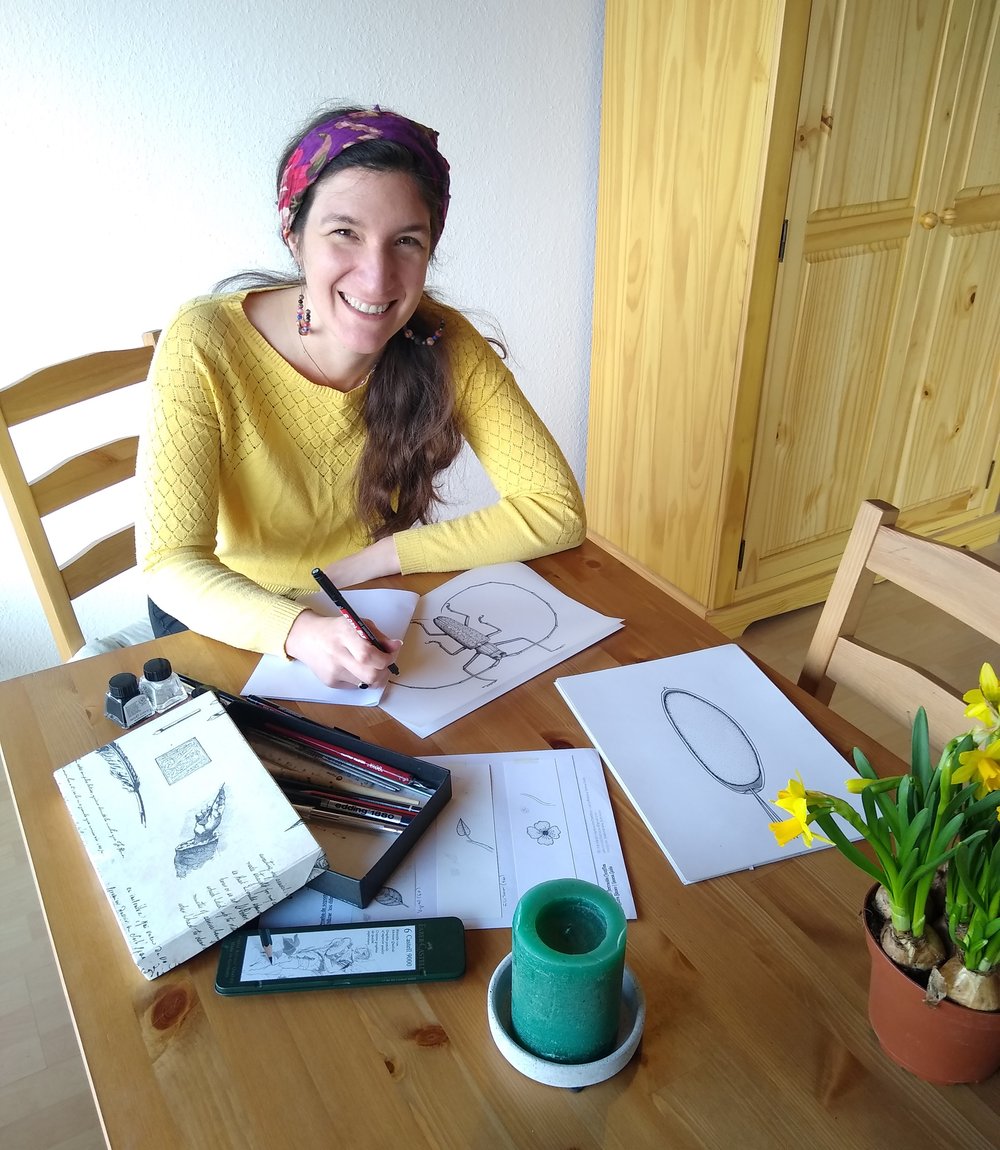
Ayelen Valko
I am both a cellular biologist and a plastic artist.
Originally from Argentina, I pursued my studies in Biology at the University of Buenos Aires (UBA). My Ph.D. was completed at the Leloir Institute in Buenos Aires, where I explored the molecular mechanisms that trigger starvation-induced macro-autophagy in the fruit fly, Drosophila melanogaster. This project required me to gain proficiency in diverse microscopy techniques, granting me access to the fascinating sub-cellular universe.
I currently reside in Heidelberg, Germany. I moved here to study a particular type of endoplasmic reticulum autophagy called micro-ER-phagy in yeasts, which involves a remarkable reorganization of this organelle. Thus, I joined Dr. Sebastian Schuck’s laboratory at Heidelberg University as a postdoctoral fellow, a journey that continued until late 2022. At present, my focus is dedicated to my artistic journey. This involves creating science-inspired cover images for scientific journals, curating exhibitions, leading science popularization initiatives, and writing articles that intertwine art and science, all while further advancing my artistic skills. In November 2023 I became a member of GEDOK, a community of women artists and art supporters. This artistic organization—with sites in 23 German cities—is the oldest and largest network for women artists throughout Europe.
To me, art has always been as important as science. In parallel to my scientific training, I was trained in various art techniques, including oil on canvas, acrylics, and graphite, at the National University of Art in Argentina. Subsequently, I specialized in scientific and naturalistic illustration, improving my abilities in watercolors, scratchboard, and inks, through experiences at institutions such as the “Ernst Haeckel” Scientific Painting Laboratory, the “Adumbratio” Scientific Illustration Center, and “Aves Argentinas“. Currently, I am synthesizing these diverse techniques and media to craft attractive science-inspired collages.
Several of my paintings have been selected as cover images for different scientific journals, including the Journal of Cell Science, Autophagy Journal, Autophagy Reports, Bio-protocol, and Developmental Biology. Additionally, I have provided detailed explanations for two of these scientific paintings in a commentary article, published in the Autophagy Journal.
My artworks have been exhibited in galleries and museums in both Argentina and Europe, among them the Quinquela Martin Museum and the Rómulo Raggio Foundation in Buenos Aires. From January to May 2023, in collaboration with fellow artist and scientist Dorotea Fracchiolla, we hosted a joint exhibition featuring our science-inspired artworks at the Complexity Science Hub in Vienna. This enriching experience was documented in a commentary article authored by both Dorotea and me for the Autophagy Journal. At present, in collaboration with Dorotea, I am coordinating another joint exhibition that focuses on our cellular and molecular artwork. This exhibition is scheduled to be held at the Max Planck Institute of Biophysics in Frankfurt on November 29th of 2023.
Short CV
Artistic training
-“Workshop on collage and graphic expressions” (online modality). Faculty: Cecilia Codoni. July 2023.
-“EMBO Workshop: Visualizing Biological Data (VIZBI 2023)”, Heidelberg, Germany. 28 – 31 March 2023.
-“Abstract painting. Level 1”. National University of Art. Faculty: Paola Brao. September-October 2022.
– “Methods in Scientific Painting” Module III “Scratchboard”. Adumbratio Ilustración Científica. Faculty: Laura Blanco & Vanesa Gaido. May 2019.
– “Methods in Scientific Painting” Module II “Ink pointillism”. Adumbratio Ilustración Científica. Faculty: Laura Blanco & Vanesa Gaido. April 2019.
– “Methods in Scientific Painting” Module I “Graphite”. Adumbratio Ilustración Científica. Faculty: Laura Blanco & Vanesa Gaido. March 2019.
– Workshop “Botanic Scientific Painting”. Aves Argentinas. Faculty: María Angélica Marino. August 2018.
– Workshop “Use of scratchboard in paintings of mammals”. Scientific Painting Laboratory “Ernst Haeckel”, La Plata, Argentina. Faculty: Dra. Julia Rouax. September 2018.
– Workshop “Botanic Painting” Technique: Graphite and Watercolors. Scientific Painting Laboratory “Ernst Haeckel”, La Plata, Argentina. Faculty: Gabriel Baloriani & Paula Marcantoni. June-July 2018.
– “Color and its possibilities”. National University of Art. School of Visual Arts Prilidiano Pueyrredón. Faculty: Cristina Dartiguelongue. September 2017.
– “Drawing and Paintings in portraits”. National University of Art. School of Visual Arts Prilidiano Pueyrredón. Faculty: Paula Cecchi & Pablo Noce. June 2017.
– “Drawing and Volume”. National University of Art. School of Visual Arts Prilidiano Pueyrredón. Faculty: Sebastián Labi. November 2016.
Scientific education
– PhD in Biological Sciences. School of Sciences, University of Buenos Aires (UBA). Thesis: “Zonda, a novel regulator of autophagy response in Drosophila melanogaster”. It was approved on March 14th 2018 with maximum grade.
– M. SC. in Biological Sciences. School of Sciences (UBA). Thesis: “Subcellular localization analysis of the Junín Virus glycoprotein complex”. It was approved on September 27th 2012 with maximum grade.
Research experience
– 2020-2022. Postdoctoral researcher at Dr. Sebastian Schuck Laboratory. Heidelberg University, Germany.
– 2018-2020. Postdoctoral researcher at Dr. Cecilia D’Alessio’s Laboratory. Leloir Institute/School of Sciences, University of Buenos Aires (UBA), Argentina.
– 2013-2018. PhD. Student at Dr. Pablo Wappner’s laboratory. Leloir Institute, Buenos Aires, Argentina.
– 2010-2012. M. Sc. Student at Dr. Nélida Candurra’s laboratory. School of Sciences, University of Buenos Aires (UBA), Argentina.
Fellowships and awards
– April 2018-April 2020. Postdoctoral fellowship granted by CONICET (National Council for Science and Technology). Advisor: Dr. Cecilia D’Alessio. Leloir Institute, Buenos Aires, Argentina.
– April 2016–April 2018. Doctoral fellowship granted by CONICET (National Council for Science and Technology). Advisor: Dr. Pablo Wappner. Co-advisor: Dr. Mariana Melani. Leloir Institute, Buenos Aires, Argentina.